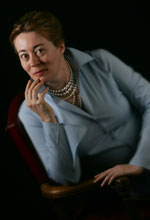 The Legacy of a Lady
The Legacy of a Lady
By Catherine Allgor
Catherine Allgor, the Visiting Kingsley Croul Professor of American History, was invited to the White House in November by First Lady Laura Bush.
A week before the historic election of 2008, I, along with a small group of historians and journalists, was invited to the White House to chat and lunch with First Lady Laura Bush. Organized by the Office of First Lady, this event was intended to share with us renovations made to the nation's house by Mrs. Bush. And indeed, she took us on a personal tour of the Lincoln bedroom and other "family rooms."
But it was also clear that her office wanted us to know something of the work that Laura Bush had done as First Lady. This impressive list of projects encompasses domestic causesfrom historic preservation to Katrina reliefas well as international efforts, including the United Nations Literacy Decade, fighting AIDS in Africa, and bringing breast care awareness to the Middle East. It is not an exaggeration to say that people, many of them women and children, are alive because of her.
Sitting in the room where the Bushes received heads of state, and listening to Mrs. Bush share stories and answer questions in her soft, controlled voice, I had two thoughts. First, I had no idea that Laura Bush had done so much for our country and the world. And I am guessing I wasn't the only one in the room who felt that way. I would bet that even the most fervent Bush supporter or Republican Party devotee would have been equally surprised.
That led me to my second thought, as I scanned the lists of her accomplishments. This was the legacy of a lady. Not just a capital "L" First Lady, but the kind of lady my mother and grandmother wanted my sister and me to be. The essence of "ladyhood" is effacement, always putting others before one's self, whether that means not taking the last cookie or putting strangers at ease by finding a common topic of conversation.
The role of Lady takes all of the human values and qualities we label as "feminine" (such as peacefulness, kindness, and nurturance) and elevates them. As I looked over the impressive list of Mrs. Bush's accomplishments, I saw those feminine values in action. Her care for women and children, her focus on healing bodies, uplifting minds, and soothing hearts truly showed her to be our First Lady. Ironically, her unwillingness to put herself forward, to take creditto "show off," as my mother would sayis also what makes her a lady. And there is an element of sadness in that realization; it means Americans might not have appreciated her when we had her.
Our new First Lady Michelle Obama is from my generation. We didn't necessarily grow up to be ladies; we became women. Women do a lot of unladylike things, such as speak truth to power, whichrather than diffuse conflict (a lady's first priority)tends to stir up trouble. Still, I imagine that, as with me, Mrs. Obama retains some of her earlier "lady training," beyond such rules such as never offering a creamer handle-first, and never eating in white gloves. Rather, I hope she prizes the larger lessons of ladyhood: empathy, sensitivity to the needs and emotions of others, and the impulse to make life calm and peaceful.
The difference that we 21st century women can make (including Mrs. Obama) is to take the Legacy of Ladies, First and otherwise, out of its seemingly private sphere and make it the core of our national mission. Earnest consideration of Laura Bush's legacy means that we appreciate an agenda valuing health and wellness, caring, anddare I say it?love. Efforts that include Mrs. Bush's outreach to people across the world should not be part of a "behind the scenes" diplomatic activitythey should be center stage.
When my mother admonished, "Act like a lady!" she really meant, "Please remember you are sharing this space with others! Don't intrude on them. What you can do to make things more pleasant for everyone?"
That's not a bad way to start constructing a national policy.
Catherine Allgor's areas of expertise include women in government, the influence of first lady (and potential first lady), gendered politics, the influence of gender on election outcome, female vs. feminine values, and first lady as future presidential candidate. She is the author of Parlor Politics: In Which the Ladies of Washington Help Build a City and a Government and A Perfect Union: Dolley Madison and the Creation of the American Nation. Allgor, who earned her Ph.D. from Yale, has spoken at the White House and has been interviewed for CNN, NPR, The New York Times, US News & World Report and various local radio and television outlets.
